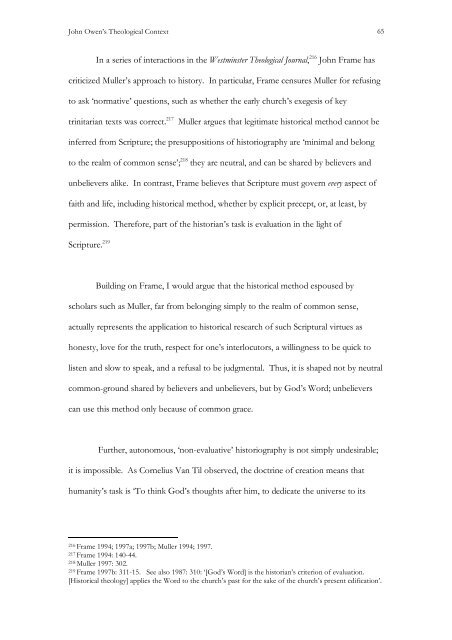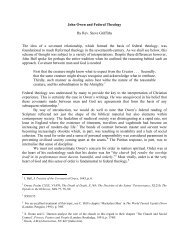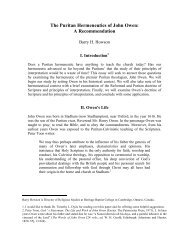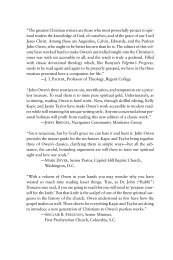M.TH. LONG DISSERTATION (LD6.1) - John Owen
M.TH. LONG DISSERTATION (LD6.1) - John Owen
M.TH. LONG DISSERTATION (LD6.1) - John Owen
You also want an ePaper? Increase the reach of your titles
YUMPU automatically turns print PDFs into web optimized ePapers that Google loves.
<strong>John</strong> <strong>Owen</strong>’s Theological Context<br />
In a series of interactions in the Westminster Theological Journal, 216 <strong>John</strong> Frame has<br />
criticized Muller’s approach to history. In particular, Frame censures Muller for refusing<br />
to ask ‘normative’ questions, such as whether the early church’s exegesis of key<br />
trinitarian texts was correct. 217 Muller argues that legitimate historical method cannot be<br />
inferred from Scripture; the presuppositions of historiography are ‘minimal and belong<br />
to the realm of common sense’; 218 they are neutral, and can be shared by believers and<br />
unbelievers alike. In contrast, Frame believes that Scripture must govern every aspect of<br />
faith and life, including historical method, whether by explicit precept, or, at least, by<br />
permission. Therefore, part of the historian’s task is evaluation in the light of<br />
Scripture. 219<br />
Building on Frame, I would argue that the historical method espoused by<br />
scholars such as Muller, far from belonging simply to the realm of common sense,<br />
actually represents the application to historical research of such Scriptural virtues as<br />
honesty, love for the truth, respect for one’s interlocutors, a willingness to be quick to<br />
listen and slow to speak, and a refusal to be judgmental. Thus, it is shaped not by neutral<br />
common-ground shared by believers and unbelievers, but by God’s Word; unbelievers<br />
can use this method only because of common grace.<br />
Further, autonomous, ‘non-evaluative’ historiography is not simply undesirable;<br />
it is impossible. As Cornelius Van Til observed, the doctrine of creation means that<br />
humanity’s task is ‘To think God’s thoughts after him, to dedicate the universe to its<br />
216 Frame 1994; 1997a; 1997b; Muller 1994; 1997.<br />
217 Frame 1994: 140-44.<br />
218 Muller 1997: 302.<br />
219 Frame 1997b: 311-15. See also 1987: 310: ‘[God’s Word] is the historian’s criterion of evaluation.<br />
[Historical theology] applies the Word to the church’s past for the sake of the church’s present edification’.<br />
65





